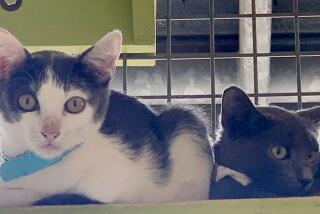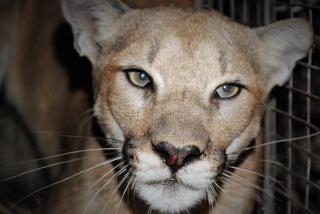Cat Refuge Has Neighbors Hissing
KINGSTON, Tenn. — Along Harvey Road, in the hills 35 miles west of Knoxville, you see mobile homes, an auto salvage yard and assorted small farms. The area is rural, and neighbors pretty much keep to themselves.
Still, when Joe and Mary Lynn Parker began building their house in 1991, folks noticed a strange-looking fenced enclosure. Someone heard it was for a large bird. Other explanations were offered.
Then the truth came out, and nothing has been the same since.
“Mr. Parker went before county commissioners . . . to tell them he was going to bring one family pet into the neighborhood--a Bengal tiger,” recalled Richard Bailey.
He lives four-tenths of a mile down the road from what the Parkers have come to call Tiger Haven. Over the years, the nonprofit sanctuary has grown to shelter 27 tigers, 16 lions, nine leopards, seven cougars, three mixed-breed ligers, two lynxes and a jaguar. Most were rescued from owners who abused them or could not care for them.
Now, after years of arguing that the animals are dangerous, neighbors have won a court ruling limiting the Parkers to one big cat. Chancery Court Judge Frank Williams ruled that the 9-acre Tiger Haven violates local zoning laws. It doesn’t fit the surrounding area.
The Parkers are appealing the decision.
If they lose, what becomes of the big cats, three times as many as are in the Knoxville Zoo? No one knows.
“There are no additional facilities in Tennessee,” said Walter Cook, coordinator of captive wildlife for the Tennessee Wildlife Resources Agency.
Roane County commissioners and longtime residents have tried to keep the animals’ fate out of the debate. They say the question is one of neighborhood self-determination comparable to the issue of a highway, shopping mall or landfill next door.
“I felt like we were really abused through propaganda,” said Commissioner Mike Hooks. “Every time you picked up the paper or turned on the television, it was always, ‘Roane County is going to kill the cats.’ This is totally a mistruth.”
Hooks voted with the commission’s 10-5 majority against a request by the Parkers for a zoning variance, even though he toured the sanctuary and was impressed with the job the Parkers have done.
“I am trying to do what is right by the people of Roane County,” he said. “I don’t want any harm to come to the cats. We are willing to do our part to help relocate them.”
How did this all get started?
Tiger Haven’s first resident was a tiger named India, which the Parkers bought because its owner was beating it with a baseball bat. That was in 1991.
Three years later, another big cat arrived. Dozens more followed, often arriving wounded or starving, from the likes of a roadside zoo in Myrtle Beach, S.C., or a crack house in Cincinnati.
“They say that we sneaked all these cats in here, that we received permission for one cat and then sneaked all the others in here,” Joe Parker said of neighbors who oppose the sanctuary. “We never received permission for the first cat, cow, dog or anything else because none was needed.”
Parker and his wife have no formal training in handling big cats. Their experience comes from raising a pair of tigers in the 1980s as volunteers at the Knoxville Zoo.
“We discovered we have a thing for tigers and they pretty much have one for us,” Parker said.
Their passion for the cats has landed them in trouble before. Joe Parker was convicted of bingo-related income tax evasion in 1990 in a scheme that was supposed to help the Knoxville Zoo, and he was ordered to shut down an illegal bingo hall in Knoxville in 1996 that was supporting Tiger Haven. In Tennessee, bingo is considered gambling and is illegal.
“Bingo was good for us,” said Parker, who said Knox County officials had assured him the game was legal. “It kept us going for a little while. But now it is donations, and we are starting some fund-raisers.”
Tiger Haven, operated by the Parkers and one employee, raised $678,753 in 1996. The sanctuary ended that year with a $639,347 balance, according to its annual filing with the Department of State’s charities division. It hasn’t filed a report since, the division said.
The dispute between the Parkers and their neighbors began after they told county commissioners that their pet was a Bengal tiger.
Finding no laws against keeping such an exotic pet, Bailey and other neighbors persuaded county officials to adopt a special agricultural zoning for animals “inherently dangerous to humans.”
Parker, who contends he never intended to create a cat sanctuary when he came to Roane County, said he didn’t learn about the zoning change until after he incorporated Tiger Haven in 1993 and rescued a second big cat in 1994.
Bailey and the others cried foul at the expansion. But Parker was armed with legal opinions saying his operation was in place before the new zoning law and was therefore exempt from it.
And so the Parkers enlarged Tiger Haven to its present size, with some 20 large enclosures surrounded by 16-foot chain-link fences, barbed-wire overhangs and double doors, all meeting state exotic animal standards. The Parkers say they spent $1.5 million.
It wasn’t until they started buying up neighboring property in 1996 to expand the sanctuary that things really heated up. Bailey and his family again charged the Parkers with violating zoning. This time, the county commission listened.
The lawsuits that followed resulted in Williams’ ruling in February. He refused in May to reconsider. The case next goes to the Tennessee Court of Appeals.
Parker worries that without places like Tiger Haven, which turned away 50 big cats last year for lack of room, there will be nowhere for abused big cats to go.
“If you can’t do it in agriculturally zoned country, where are you going to do it?” he asks.
Bailey sympathizes, but says, “It is not like a zoo, and those animals are not bulls and dogs, like they have tried to compare them to. They are known man-killers. And they have affected the quality of our life.” The roaring in the middle of the night “sounds so loud,” he says, “it’s like it is outside the window.”
More to Read
Sign up for Essential California
The most important California stories and recommendations in your inbox every morning.
You may occasionally receive promotional content from the Los Angeles Times.










